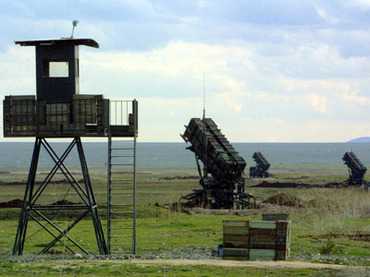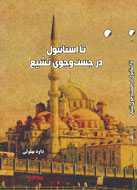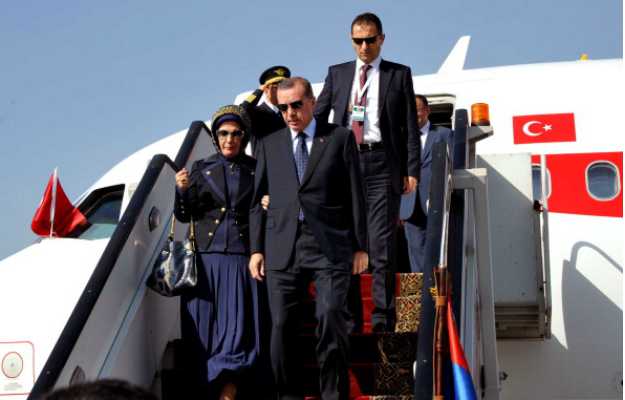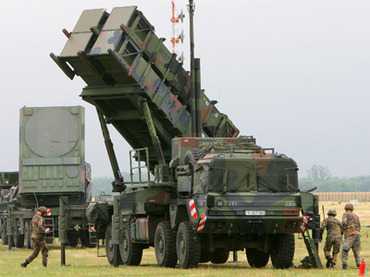By James Reynolds BBC News, Ceylanpinar, Turkey-Syria border
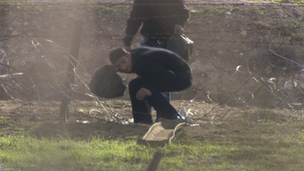
A Syrian refugee ducks wire on the border with Turkey Some Syrians prefer to cross the border unofficially
From the edges of southern Turkey, you can see the smoke of a single cigarette inside Syria. The Turkish town of Ceylanpinar is around 50m away from the Syrian town of Ras al-Ain. The two countries are separated by a barbed wire fence.
On the Syrian side, two children pick up bullet casings and clink them together. A group of opposition gunmen holds up its rifles and grenades for spectators watching from Turkey.
For several days earlier this month the Syrian army shelled Ras al-Ain to try to get rid of the rebels. Thousands of the town’s residents fled to Ceylanpinar. Syria’s war is right next door. This makes the Turkish state nervous.
On the main road facing the border, Turkey has created a small buffer zone with a roll of razor wire. Inside this zone, Turkish soldiers in one-man trenches are positioned every 30m or so.
The soldiers instruct Syrians who want to cross to walk to a nearby military position. From there, the Turkish authorities will register the new refugees and take them to well-guarded refugee camps inside Turkey.
But many Syrians thinking of crossing do not want to be confined to official camps. They have noted that the soldiers’ border duties do not appear to include early mornings.
Burnt houses
Just before 08:00, three men approach a hole in the border fence opposite a Turkish playground. A friend standing in the playground shouts instructions to them. He tells them to cross. The men duck underneath the razor wire and jog across railway tracks into Turkey.
Syrian refugee Karim Karim is separated from his family
One curses the Syrian President, Bashar al-Assad.
“Bashar forced us to leave. Bashar has no honour.”
Their friend helps them up a hillside into the small playground guarded by a roll of razor wire.
“We’ll go back very soon – I swear,” says one of men.
“People are hungry,” says Ali, one of the three. “There is no bread on the other side. They are sleeping outside. People were killed when they were in their homes.”
Later in the day, Turkish soldiers arrive to patrol the border fence. A commander fiddling with a packet of cigarettes periodically orders Syrians inside Turkey to keep their distance from the border. On the edges of the small playground, Karim talks to one of his family members on a mobile phone. His daughter clings to his legs.
“How are things over there?” he asks. “Do you have enough food?”
Karim managed to escape Ras al-Ain earlier this month when the Syrian army shelled the town. He is now trying to get the rest of his family across.
“Houses are burned down, they’re destroyed,” he says. “My family needs our help but we’re all afraid of the warplanes flying overhead.”
No place to go
Since the Syrian conflict began in March 2011, official figures show that Turkey has taken in more than 100,000 refugees. The Turkish government in Ankara is nervous about the effects of having so many Syrian refugees on its soil.
BBC map
But the local Turkish authorities in Ceylanpinar see things differently. This region is mostly Kurdish on both sides of the border. The Kurdish-speaking authorities here are keen to provide help for refugees who speak the same language, and share the same culture.
A municipal building in Ceylanpinar normally used as a condolence hall has become a canteen and a hotel. Volunteers serve dozens of refugee families a lunch of bread, rice, yoghurt and chicken.
The children have to make their way through adult-size portions. On a bench in the main hall, there is a bag of second-hand clothes for those who have left everything behind.
In the courtyard, a middle-aged volunteer wearing a suit dutifully takes his place in a circle of children playing a game. Another volunteer, Ali Kirdar, sits on a bench and rolls a cigarette. He spends his time finding newly escaped refugees and bringing them to the hall.
“Many of the refugees have no place to go,” he says.
“So you can find them in nearby parks with their belongings at their feet. They just sit and stare ahead. You can tell that they don’t know anyone and that they need help.”
Syrian refugees at border with Turkey
Local discontent
Not everyone appreciates the new arrivals. At a hairdressers in Ceylanpinar, the barber says that a refugee from Syria recently stole one of the boxes of canaries that he keeps on a ledge above the mirror.
Behind the barber’s chair, Orhan Guven waits patiently for a haircut. He sent the rest of his family away from this area – after bullets from Syria hit their house.
“A piece of shrapnel grazed my grandmother as she was sitting in our courtyard,” he recalls.
“The government has evacuated nearby villages but there are houses here only 30m from the border which have not been evacuated. We are left on our own – that’s how we feel.”
The Turkish military wants to keep the border quiet. Throughout the day soldiers try to break up crowds of Syrians shouting to their friends across the border. A water cannon is deployed to get the crowd to disperse.
The Turkish state may host tens of thousands of Syrian refugees, but it does not want them to make too much noise.
via BBC News – Syrian refugees slipping into Turkey.


